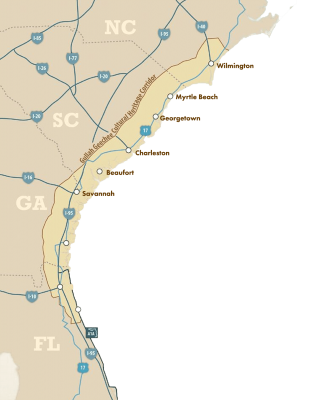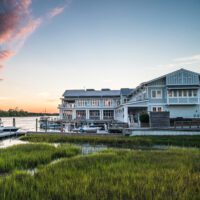WILMINGTON – The North Carolina State Ports Authority’s proposed Wilmington harbor project area includes a congressionally designated cultural corridor, one a local branch of the NAACP is urging federal regulators to protect.
The Brunswick County branch of the nation’s oldest civil rights organization has raised a number of concerns in its comments to the Army Corps of Engineers’ Wilmington District about the proposed project’s potential affects to the Gullah Geechee Cultural Heritage Corridor, environmental justice communities as well as the overall environment of the Cape Fear River, and adjoining waterways.
Supporter Spotlight
“The point that we were making in the letter is that this is a congressionally designated heritage corridor,” said Brayton Willis, a member of the branch’s environmental justice and climate committee. “We’re pointing out the importance of recognizing this historic and culturally significant area and I think it’s incumbent upon those that want to do work in these areas that they not only look at protecting and preserving the historic nature of that area, but also make sure that we deal with issues of environmental justice as well.”

The civil rights organization submitted its comments last week on the project, which would widen and deepen the harbor channel to make way for larger container ships being used in Asia.
Willis, a retired Corps senior project manager and strategic planner, said that the heritage corridor has received little to no acknowledgement in the ports authority’s draft feasibility study or previous projects, including the Cape Fear River Crossing highway-bridge.
Work on that proposed project came to a halt in August after transportation officials determined it lacked enough public support to fund.
“In that case the heritage corridor was not recognized as well,” Willis said. “What we did and will continue to do is to put a spotlight on this and other critical issues such as global warming. We’re going to pay hard attention to projects like this as we move forward.”
Supporter Spotlight
The Gullah Geechee Cultural Heritage Corridor runs up the East Coast from Florida to just shy of Jacksonville and extends 30 miles from the coast inland. It is one of 55 designated National Heritage Areas throughout the country and one of two in North Carolina, according to the National Park Service.
Gullah Geechee are descendants of Africans enslaved on rice, indigo and Sea Island cotton plantations of the lower Atlantic Coast.
The NAACP’s Brunswick branch asks the Corps to work with the Gullah Geechee Cultural Heritage Corridor Commission, the National Park Service and the local Gullah Geechee community to avoid, minimize and mitigate any potential impacts.
“We also encourage the (Corps) to reach out and engage local Gullah Geechee groups and individuals in our community and other (environmental justice) communities in a meaningful way to solicit their input on this project,” the letter states.
The organization also asks the Corps to identify environmental justice communities within and adjacent to the project area and evaluate impacts associated with increased river and highway traffic, noise and the potential to introduce invasive species, as well as impacts to fisheries and water and air quality.
The letter states that one of the group’s greatest concerns is how the proposed harbor project will impact environmental resources in the face of global warming.
“We are now witnessing king tides, rising seas levels, and the incredible damage caused by recent hurricanes and major storms. We ask that your evaluation of this project look well forward into the future and contain a thorough examination of the full range of risks and uncertainties related to greenhouse gas emission impacts and required mitigation. We strongly suggest that USACE review and analyze the findings and observations related to climate change and its impacts on stream flow and runoff patterns as well as the warming of lakes and rivers, with effects on thermal structure and water quality.”
The Corps is in the beginning stages of reviewing the proposed project through the National Environmental Policy Act, or NEPA, process. Through NEPA, the Corps will assess likely environmental impacts of the proposed project and project alternatives.







